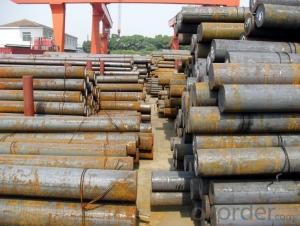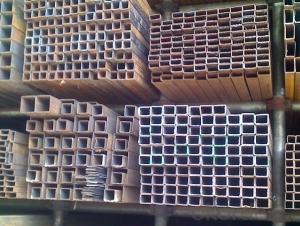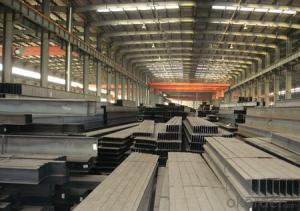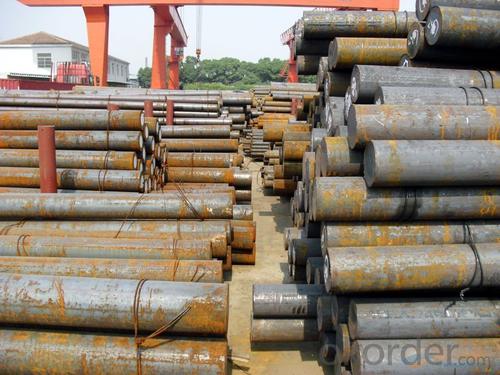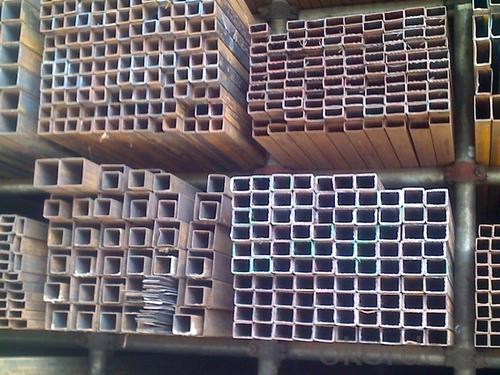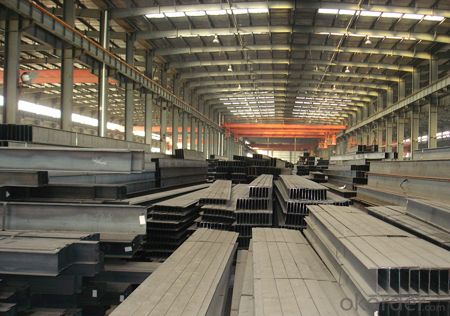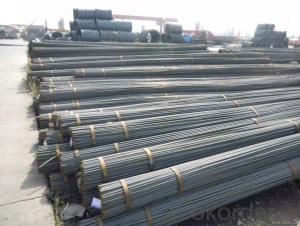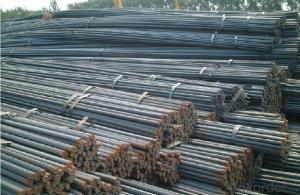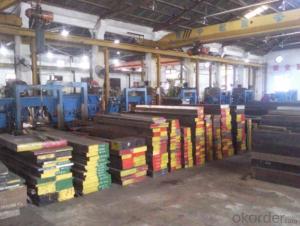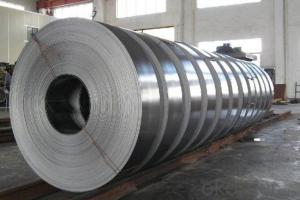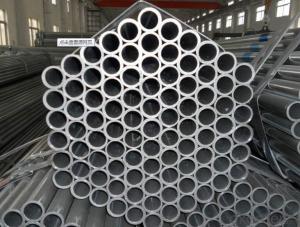Steels China Manufacture Building Material Construction
- Loading Port:
- Tianjin
- Payment Terms:
- TT OR LC
- Min Order Qty:
- 100 m.t
- Supply Capability:
- 1000 m.t/month
OKorder Service Pledge
OKorder Financial Service
You Might Also Like
1.Packaging & Delivery
Packaging Detail: | in bundles or as customer's requirement |
Delivery Detail: | Within 30days after receiving your deposit or copy of L/C |
2.Specifications
HRB400,HRB500 Steel Rebars
1.China direct supplier
2.Best service
3.Competitive price
4.Quantity assured
3.Product Description
Name | High Tensile Export Reinforcing Steel Bar ,Deformed Steel Bar ,HRB400B,HRB,46B,HRB500 Building Construction Material |
Standard | ASTM A615 /BS BS 4449 /GB HRB/ JIS G3112 |
Grade | A615 Gr40/60/75 BS 4449 Gr460,B500 GB HRB335,HRB400 ,HRB500
JIS G3112 SD390
|
Diameter | 6mm-40mm |
Length | 6-12m |
Technique | Low temperature hot-rolling reinforcing deformed steel rebar |
Tolerance | As the standard or as your requirement |
Application | Building, construction, road, bridge,etc |
Certificated | BV |
MOQ | 500tons per size steel rebar |
Packing details | Steel rebar packed in bundle or as your requirement |
Delivery | Within 30 days after deposit |
Payment | T/T or L/C |
4.Chemical Composition
Grade | Technical data of the original chemical composition (%) | |||||||
C | Mn | Si | S | P | V | |||
HRB400 | ≤0.25 | ≤1.60 | ≤0.80 | ≤0.045 | ≤0.045 | 0.04-0.12 | ||
Physics capability | ||||||||
Yield Strength(N/cm2) | Tensile Strength(N/cm2) | Elongation (%)
| ||||||
≥400 | ≥470 | ≥14 | ||||||
Grade | Technical data of the original chemical composition (%) | |||||||
C | Mn | Si | S | P | V | |||
HRB500 | ≤0.25 | ≤1.60 | ≤0.80 | ≤0.045 | ≤0.045 | 0.04-0.12 | ||
Physics capability | ||||||||
≥500 | ≥630 | ≥12 | ||||||
5. Theorectical weight
Diameter (MM) | Cross Sectional Area (MM2) | Theorectical Weight (KG/M) | Weight of 12M Bar (KG) | A Ton Contains 12M Bars (PCS) |
6 | 28.27 | 0.222 | 2.664 | 375.38 |
8 | 50.27 | 0.395 | 4.74 | 210.97 |
10 | 78.54 | 0.617 | 7.404 | 135.06 |
12 | 113.1 | 0.888 | 10.656 | 93.84 |
14 | 153.9 | 1.21 | 14.52 | 68.87 |
16 | 201.1 | 1.58 | 18.96 | 52.74 |
18 | 254.5 | 2 | 24 | 41.67 |
20 | 314.2 | 2.47 | 29.64 | 33.74 |
22 | 380.1 | 2.98 | 35.76 | 27.96 |
25 | 490.9 | 3.85 | 46.2 | 21.65 |
28 | 615.8 | 4.83 | 57.96 | 17.25 |
32 | 804.2 | 6.31 | 75.72 | 13.21 |
36 | 1018 | 7.99 | 98.88 | 10.43 |
40 | 1257 | 9.87 | 118.44 | 8.44 |
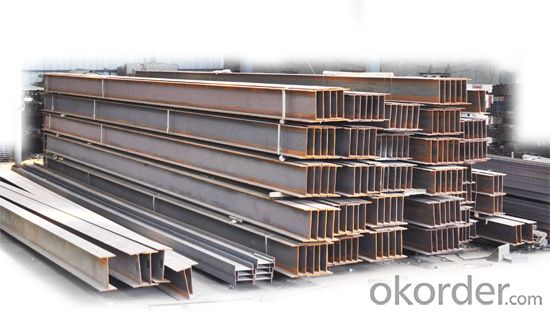
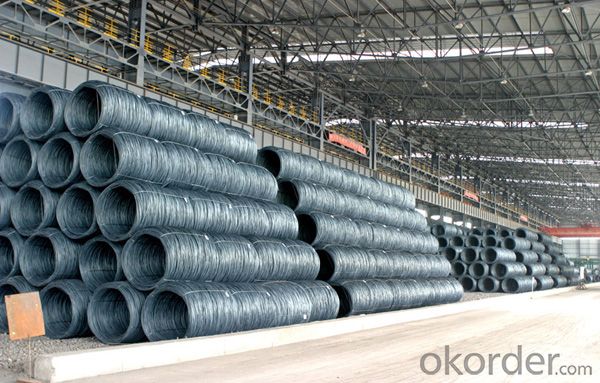
- Q: Can steel pipes be used for underground stormwater systems?
- Yes, steel pipes can be used for underground stormwater systems. Steel pipes are known for their durability and strength, making them suitable for withstanding the pressure and weight of underground stormwater systems. Additionally, steel pipes have a high resistance to corrosion, which is important when dealing with stormwater that may contain various contaminants. However, it is important to properly coat and protect the steel pipes to prevent any potential corrosion or damage over time. Regular maintenance and inspections should also be carried out to ensure the integrity of the steel pipes and the overall performance of the underground stormwater system.
- Q: How are steel pipes used in the manufacturing of pressure vessels?
- Steel pipes are commonly used in the manufacturing of pressure vessels due to their high strength and ability to withstand high pressure. These pipes are utilized as the primary material for constructing the shell of the pressure vessel, providing a robust and reliable structure. Additionally, steel pipes offer excellent resistance to corrosion, making them suitable for various industries and applications where pressure vessels are required, such as oil and gas, chemical processing, and power generation.
- Q: Can steel pipes be used for oil and gas transportation?
- Indeed, steel pipes are capable of being employed for the transportation of oil and gas. In the oil and gas sector, steel pipes are extensively utilized owing to their robustness, longevity, and capacity to withstand high-pressure environments. They are frequently employed for the conveyance of crude oil, natural gas, and related substances across extensive distances. Steel pipes exhibit exceptional resistance to corrosion and are capable of enduring extreme temperatures, thus rendering them suitable for both onshore and offshore applications. Moreover, steel pipes can be easily welded, facilitating the construction of intricate pipeline networks that efficiently transport oil and gas from production fields to refineries and distribution centers.
- Q: How are steel pipes used in the construction of bridges?
- Steel pipes are commonly used in the construction of bridges as they provide structural support and stability. These pipes are used for various purposes, such as creating the framework, piling, and supporting the bridge's weight. Additionally, steel pipes are often used in the construction of bridge piers and abutments, as well as for drainage systems and utility tunnels. Their high strength and durability make steel pipes essential components in ensuring the safety and longevity of bridge structures.
- Q: What is the difference between internal lining and external coating of steel pipes?
- The internal lining of steel pipes refers to a protective layer or coating applied inside the pipe to prevent corrosion and to enhance the flow of fluids. This lining is typically made of materials like epoxy, cement mortar, or polyethylene, and it helps to reduce friction and resist the effects of chemicals or contaminants that may be present in the fluid being transported. On the other hand, the external coating of steel pipes is a layer or coating applied to the outside of the pipe to protect it from external factors like weather, soil, or mechanical damage. This coating is usually made of materials such as fusion-bonded epoxy, polyethylene, or polypropylene, and it acts as a barrier against corrosion, moisture, or abrasion. In summary, the internal lining of steel pipes focuses on protecting the pipe from the inside, while the external coating is intended to safeguard the pipe from external elements. Both the internal lining and external coating are essential for maintaining the integrity and longevity of steel pipes.
- Q: How are steel pipes used in the renewable energy sector?
- Steel pipes are widely used in the renewable energy sector for various applications. They are commonly used for the construction of wind turbine towers, providing structural support and stability. Steel pipes are also used in the construction of solar power plants, where they are utilized for the installation of solar panels, mounting structures, and support systems. Additionally, steel pipes are employed in geothermal energy projects, helping to extract and transfer hot water or steam from underground reservoirs. Overall, steel pipes play a crucial role in the renewable energy sector by facilitating the efficient generation and transmission of clean energy.
- Q: Hot galvanized steel pipe for use?
- The use of hot galvanized steel pipe: mainly used for the delivery of gas, heating.In the greenhouse gas, heating, with the kind of pipe and galvanized pipe, galvanized pipe as a water pipe, produced a lot of rust in the tube, the outflow of water not only pollute the sanitary ware, and mixed with smooth inner wall corrosion caused by bacteria, heavy metal content in the water is too high, serious harm to human health. In 60s and 70s, developed countries began to develop new types of pipes, and galvanized pipes were banned. China's Ministry of construction and other four ministries have also issued a civilization, from two, 000 years since the prohibition of galvanized pipe, the current New District cold water pipe has rarely used galvanized pipe, and some of the hot water pipe is galvanized pipe.
- Q: Seamless steel pipe and welded pipe what is the difference?
- Identification method: see the inside of the pipe, because the external, will deal with the welded pipe is inside a gap, you can see some, some, is not easy to see, you can slowly by hand touch, or see the specifications are relatively thin, welded pipe
- Q: What are the different grades of steel used in pipes?
- The different grades of steel used in pipes vary based on their composition and properties. Some common grades include carbon steel (such as ASTM A106 or API 5L), stainless steel (such as ASTM A312 or ASTM A269), and alloy steel (such as ASTM A335). Each grade has specific characteristics that make it suitable for different applications, such as high temperature or corrosive environments.
- Q: What are the common factors affecting the lifespan of steel pipes?
- There are several common factors that can affect the lifespan of steel pipes. 1. Corrosion: Corrosion is one of the primary factors that can significantly reduce the lifespan of steel pipes. Exposure to moisture, chemicals, and harsh environmental conditions can cause the steel to rust and deteriorate over time. 2. Quality of materials: The quality of the steel used in manufacturing the pipes plays a crucial role in determining their lifespan. Higher-quality steel with better resistance to corrosion and other forms of degradation will generally have a longer lifespan compared to lower-grade materials. 3. Installation and maintenance practices: Proper installation and regular maintenance are essential for ensuring the longevity of steel pipes. Improper installation techniques, such as inadequate support or improper alignment, can lead to premature failure. Similarly, neglecting routine maintenance, such as cleaning and inspection, can accelerate the degradation process. 4. Operating conditions: The operating conditions to which steel pipes are exposed can also impact their lifespan. Factors such as temperature, pressure, and the type of fluid or gas being transported can all affect the integrity of the pipes. Extreme conditions, such as high temperatures or corrosive substances, can significantly reduce the lifespan of steel pipes. 5. Mechanical stress: Excessive mechanical stress, such as vibration, impact, or heavy loads, can weaken steel pipes over time. This stress can lead to cracking, deformation, or even complete failure if not properly managed or accounted for during the design and installation process. 6. Environmental factors: The surrounding environment can have a significant impact on the lifespan of steel pipes. Exposure to harsh weather conditions, such as extreme temperature variations or frequent freeze-thaw cycles, can accelerate the deterioration process. Additionally, the presence of pollutants or aggressive substances in the surrounding soil or water can also contribute to the degradation of steel pipes. In summary, the lifespan of steel pipes can be affected by factors such as corrosion, material quality, installation and maintenance practices, operating conditions, mechanical stress, and environmental factors. By considering and addressing these factors, it is possible to extend the lifespan of steel pipes and ensure their durability and reliability.
Send your message to us
Steels China Manufacture Building Material Construction
- Loading Port:
- Tianjin
- Payment Terms:
- TT OR LC
- Min Order Qty:
- 100 m.t
- Supply Capability:
- 1000 m.t/month
OKorder Service Pledge
OKorder Financial Service
Similar products
Hot products
Hot Searches
Related keywords
